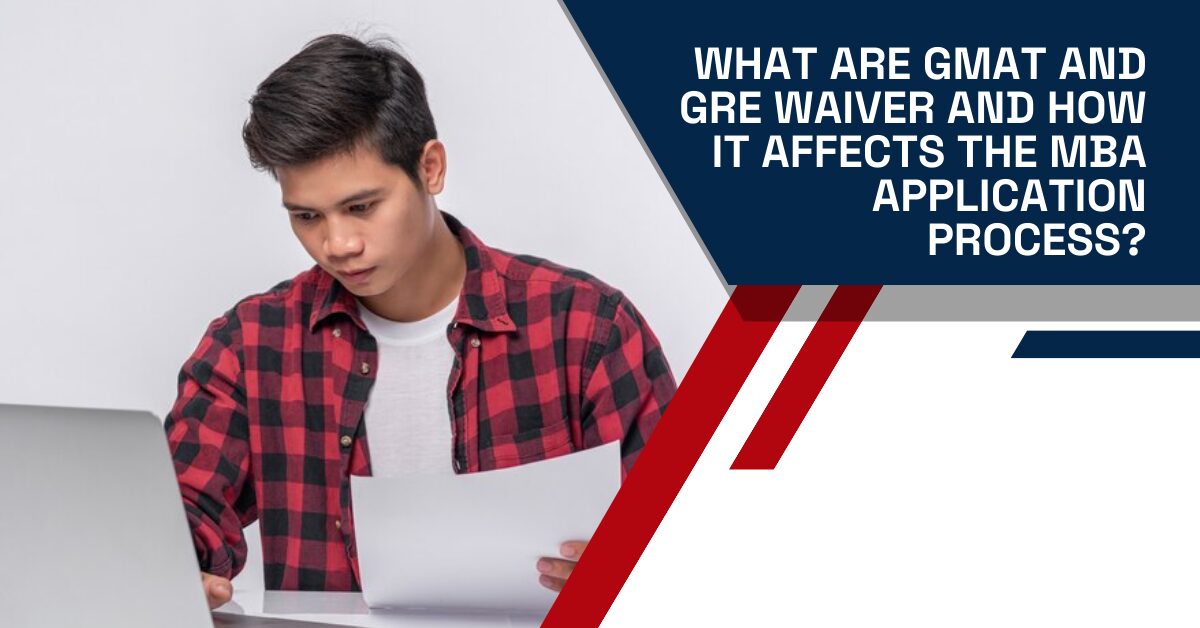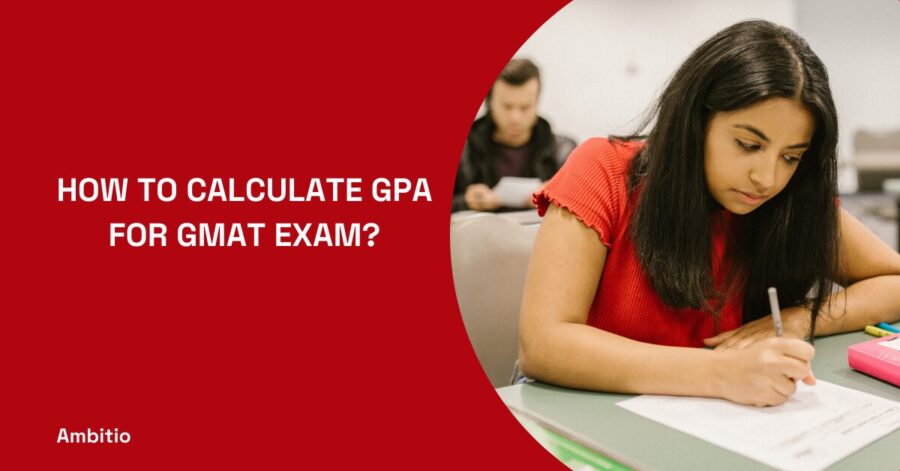4 September 2024
5 minutes read
What are GMAT and GRE Waiver and How It Affects the MBA Application Process?

Key Takeaways
- GMAT and GRE waivers are increasingly common, offering a test-free path to top MBA programs for qualified candidates.
- Eligibility typically hinges on strong work experience, academic performance, or professional certifications—each school has its own criteria.
- While waivers open doors, applicants should weigh their options carefully and be prepared to take the tests if needed.
Recent data shows that over 50% of top MBA programs now offer GMAT or GRE waivers under certain conditions. This shift represents a significant change in the business school application landscape, potentially altering the path for thousands of aspiring MBA candidates each year. As the admissions process evolves, it’s crucial for applicants to understand these new options.
While standardized tests have long been a cornerstone of MBA admissions, schools are increasingly recognizing that test scores alone may not fully capture a candidate’s potential. The introduction of GMAT and GRE waivers offers an alternative route for qualified applicants, particularly those with substantial work experience or strong academic backgrounds. This article explores the implications of these waivers and how they’re reshaping the MBA application process.
What is a GMAT and GRE Waiver ?
A GMAT or GRE waiver allows applicants to skip taking these standardized tests when applying to business school. It’s a way for schools to evaluate candidates without relying solely on test scores.
Here’s what you need to know:
- Waivers are offered by many business schools for their MBA programs
- They consider factors like work experience, GPA, and other qualifications instead of test scores
- Each school has its own eligibility criteria for waivers
- You typically need to submit a waiver request as part of your application

Common waiver eligibility factors include:
- Strong undergraduate GPA (often 3.0 or higher)
- Relevant work experience (usually 3-5+ years)
- Advanced degrees or certifications (like CFA)
- Quantitative coursework or background
The application process usually involves:
- Checking if you meet the school’s waiver criteria
- Submitting a waiver request before the application deadline
- Providing supporting materials (transcripts, resume, etc.)
- Waiting for the admission committee’s decision
Remember, policies vary by school. Always check with the specific program you’re applying to for their exact requirements.
Business Schools Offering GMAT Waiver
This table lists a selection of business schools that offer GMAT/GRE test waivers for their MBA programs, along with the criteria for obtaining a waiver.
| Business School | Waiver Criteria |
|---|---|
| University of Virginia (Darden) | Professional experience, prior graduate degree |
| Indiana University (Kelley) | Work experience, undergraduate GPA, advanced degrees |
| University of North Carolina (Kenan-Flagler) | Professional experience, academic performance, certifications |
| University of Washington (Foster) | Work experience, advanced degrees, military experience |
| Michigan State University (Broad) | Professional experience, advanced degrees |
| University of Texas at Austin (McCombs) | Extensive work experience, advanced degrees |
| Rice University (Jones) | Professional experience, advanced degrees |
| Rutgers University | Work experience, prior graduate degree |
| University of Southern California (Marshall) | Professional experience, prior graduate degree |
| Northeastern University (D’Amore-McKim) | Professional experience, academic performance, certifications |
What types of GMAT/GRE Test Waivers Are Available?
GMAT and GRE waivers allow qualified applicants to skip these standardized tests when applying to business school. Many schools of management now offer waivers, recognizing that test scores aren’t the only indicator of potential success in an MBA program.
Waiver eligibility often depends on factors like work experience, undergraduate degree performance, and professional certifications. A strong cumulative GPA (usually 3.0 or higher) from your undergraduate studies can help. Significant work experience, typically 5+ years, is also valuable when requesting a waiver.
To apply for a waiver, you’ll need to submit your application along with a separate waiver request to the admission committee. Each school of business has its own criteria, so it’s important to check the specific requirements for each program you’re interested in.
Remember, even if you plan to request a waiver, it’s wise to be prepared to take the GMAT if needed. Some full-time MBA programs have stricter policies about standardized test scores than others.
The waiver process aims to create a more inclusive application process, recognizing that there are multiple ways to demonstrate readiness for graduate-level business coursework.
Who is Eligible for a GMAT/GRE Test Waiver?
Eligibility for a GMAT/GRE test waiver varies by business school. MBA applicants with several years of professional experience, advanced degrees, or relevant certifications like CPA or CFA are often eligible for a standardized test waiver. Online MBA programs may have slightly different requirements but generally focus on professional and academic achievements.
To request a test waiver, applicants must submit a detailed application highlighting their professional milestones, academic background, and certifications. Schools grant waivers to applicants who demonstrate that their experience and qualifications are equivalent to a strong GRE score or GMAT requirement.
When should applicants apply for GMAT/GRE test waivers?
Applicants should consider submitting a test waiver request early in the application process. Many MBA programs have specific deadlines for these requests, often well before the final application date. If you have substantial professional work experience or strong quantitative skills, you may qualify for a waiver, eliminating the need to take the Graduate Management Admission Test (GMAT) or GRE.
Review the MBA program’s guidelines to understand their criteria for waivers. Once you meet these, prepare your documents and request a waiver as soon as possible. This ensures you have enough time to submit your MBA application without delays. Early submission also gives admissions committees ample time to review your qualifications and make a decision regarding your test waiver request.
What else should an applicant consider when deciding whether to apply for a test waiver?
When deciding whether to apply for a test waiver, applicants should consider several factors. Without a test score, admissions committees will place greater emphasis on your academic and professional achievements. Strong performance in these areas is crucial for waiving the GMAT or GRE.

Applicants should also explore waiver opportunities such as the Executive Assessment, which some programs that offer waivers accept as an alternative. Reviewing the specific criteria and deadlines of programs that grant waivers to applicants is essential. Each school has different requirements, so it’s important to understand what they value most.
Make sure to complete the waiver request form thoroughly, providing detailed evidence of your qualifications. Programs that offer waivers typically require applicants to request them early, so plan ahead to ensure you meet all deadlines and have ample time to prepare your MBA application.
Conclusion
The rise of GMAT and GRE waivers in MBA admissions represents a significant shift in how business schools evaluate applicants. This trend acknowledges that professional experience, academic achievements, and other qualifications can be strong indicators of an applicant’s potential for success in an MBA program.
While waivers offer a valuable alternative path, they’re not universally available or suitable for everyone. Prospective MBA students should carefully consider their individual circumstances, research specific school policies, and plan their application strategy accordingly.
Whether you pursue a waiver or take the standardized tests, remember that it’s just one part of your application. Focus on presenting a well-rounded profile that showcases your unique strengths and readiness for the challenges of an MBA program. As the admissions landscape continues to evolve, staying informed and adaptable will be key to navigating your path to business school success.
Unlock Your Potential: Excel in GRE with Ambitio’s Expert Training! Our seasoned instructors will guide you through a personalized prep plan, optimizing your performance and boosting your confidence.
FAQs
What exactly is a GMAT/GRE waiver?
It’s an option that allows you to apply to an MBA program without submitting standardized test scores, based on other qualifications.
How do I know if I’m eligible for a waiver?
Check the specific requirements of your target schools. Common criteria include strong work experience, high GPA, or relevant certifications.
Will applying with a waiver hurt my chances of admission?
Not necessarily. Schools offering waivers evaluate your entire profile. A strong application can be competitive without test scores.
Can I apply for a waiver after submitting my application?
Generally, no. Waiver requests are typically part of the initial application process. Check school deadlines carefully.
If my waiver is denied, can I still apply?
Usually, yes. Most schools will allow you to take the GMAT/GRE and submit scores if your waiver is denied.
Are waivers available for all types of MBA programs?
Waivers are more common for part-time and executive MBAs, but many full-time programs now offer them too. Always check with specific schools.
Should I request a waiver if I have a good test score?
If you have a competitive score, it’s often better to submit it. Test scores can strengthen your application, even when waivers are available.

You can study at top universities worldwide!
Get expert tips and tricks to get into top universities with a free expert session.
Book Your Free 30-Minute Session Now! Book a call now




























